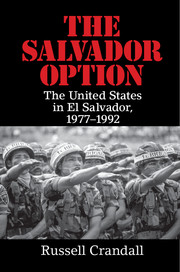Book contents
- Frontmatter
- Dedication
- Epigraph
- Contents
- List of Figures
- List of Organizations
- Acknowledgments
- 1 Introduction
- PART ONE EL SALVADOR IN THE COLD WAR
- PART TWO JIMMY CARTER
- PART THREE RONALD REAGAN
- PART FOUR GEORGE H. W. BUSH
- 39 Elusive Justice
- 40 Pessimism
- 41 Bush Arrives
- 42 Bush, Cristiani, and the 1989 Vote
- 43 Guerrilla Second Final Offensive, November 1989
- 44 Jesuit Killings
- 45 SAMs
- 46 United Nations and Peace
- 47 Demobilization
- PART FIVE POSTWAR
- Notes
- Bibliography
- Index
47 - Demobilization
from PART FOUR - GEORGE H. W. BUSH
Published online by Cambridge University Press: 05 June 2016
- Frontmatter
- Dedication
- Epigraph
- Contents
- List of Figures
- List of Organizations
- Acknowledgments
- 1 Introduction
- PART ONE EL SALVADOR IN THE COLD WAR
- PART TWO JIMMY CARTER
- PART THREE RONALD REAGAN
- PART FOUR GEORGE H. W. BUSH
- 39 Elusive Justice
- 40 Pessimism
- 41 Bush Arrives
- 42 Bush, Cristiani, and the 1989 Vote
- 43 Guerrilla Second Final Offensive, November 1989
- 44 Jesuit Killings
- 45 SAMs
- 46 United Nations and Peace
- 47 Demobilization
- PART FIVE POSTWAR
- Notes
- Bibliography
- Index
Summary
I do not have any land, and the army is still full of people who want to kill me.
– Miguel Ángel, FMLN guerrilla, October 1992El Salvador will be the grave where the Reds meet their end.
– ARENA's campaign song during the war“Joaquín! Joaquín!”
On February 1, 1992, only two weeks after the historic peace accord signings in Mexico City, the government and guerrillas sat down for a ceremony to begin the ceasefire, which 10 months later would mark the formal end of the 12-year civil war. In the next several days, the Salvadoran legislature approved a sweeping and controversial amnesty for “politically motivated crimes” committed during the war. The 81–0 vote was a vital development given that it allowed the 8,000-person rebel army to disarm without fear of prosecution – a point that had been a key stumbling block. The legislation excluded certain special cases, including preventing the release of those convicted of the 1989 Jesuit murders.
Symbolizing this new era in El Salvador's history, the National Commission for the Consolidation of Peace (Comisión de Paz, COPAZ) was inaugurated at the February ceasefire ceremony held in an auditorium in San Salvador and comprised government officials, former guerrillas, and civilian members from each political party. During the ceremony, guerrillas in newly purchased business suits stood next to uniformed military officers; rightist politicians stood beside leftists as the national anthem was sung. Later that same day, President Cristiani led the ceremonial lighting of a peace torch; military and police units attended masses in barracks around the country; and rebel supporters once again organized all-day parties in downtown plazas where vendors sold newly manufactured FMLN T-shirts.
As the ceremony began, Cristiani entered the auditorium surrounded by his bodyguards and ARENA colleagues and received modest applause from the 3,000 people in attendance. Joaquín Villalobos, on the other hand, was greeted with loud applause and cheers of “Joaquín! Joaquín!” Villalobos then sat down at a table directly to the left of Colonel Juan Orlando Zepeda, a senior FAES officer implicated by the Moakley Commission as one of the “intellectual authors” of the Jesuit killings. As one observer wrote, “Even those who hoped for the end of the war probably never thought they would see these two men sitting together.
- Type
- Chapter
- Information
- The Salvador OptionThe United States in El Salvador, 1977–1992, pp. 472 - 484Publisher: Cambridge University PressPrint publication year: 2016



